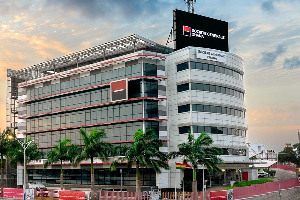- Home - News
- TWI News | TV
- Polls
- Year In Review
- News Archive
- Crime & Punishment
- Politics
- Regional
- Editorial
- Health
- Ghanaians Abroad
- Tabloid
- Africa
- Religion
- Election 2020
- Coronavirus
- News Videos | TV
- Photo Archives
- News Headlines
- Press Release
General News of Thursday, 10 February 2011
Source: Food Security Ghana
Ghanaian Consumers under preasure as cedi continue s to slide
Ghanaian consumers under pressure as cedi continues to slide
The sudden depreciation of the Ghana cedi by more than 1.54% in January 2011
has sparked fears that this weakening may impact negatively on food prices in
2011 and add to the expected new food crisis as warned by the FAO (Food and
Agricultural Organization).
Various reasons are given for the sudden depreciation that saw the currency
reach record lows in January 2011. These include a high demand for US dollars
for importation of clothing, cars and foodstuff linked to an unexpected higher
import spending over the Christmas period.
In addition some analysts claim that offshore investors are selling government
bonds, recouping cedis and converting them into dollars – thus putting pressure
on the cedi, which was stable within the 1.42 – 1.44 band for most of 2010.
Further investigations also revealed that the claimed depreciation rate is in
fact much higher than what the Bank of Ghana announced. Business buy dollars
from the commercial banks and their rates have gone from 1.43 to 1.53 in that
period, a depreciation of more than 6 percent.
In a statement issued by the Food and Beverages Association of Ghana (FABAG),
the Chairman Mr. Nabil Moukarzel that the current situation was inimical to
trade and could create severe repercussions on the ordinary consumer. The
falling cedi coupled with the recent increase in the prices of petroleum
products, could cause price hikes on food items, he said.
In 2010 the World Bank and the FAO warned that the food crisis that hit the
world in 2008 is far from over and that a renewed wave of high food prices may
place extreme pressure on consumers in especially developing countries in 2011.
Last year the issue of food security in Ghana was debated in great depth.
Although everybody agreed that the government must place high priority on the
development of the local production of foodstuff such as wheat and rice,
analysts said that it is a long-term project and that the deficit of about
seventy percent in cases such as rice will not be wiped out by local production
in the foreseeable future.
Consumers and traders from all over the country also cried out about the high
food prices, and many calls were made to the government to reduce import tariffs
on basic foodstuff that stood at 37.5 percent compared to the 12.5 percent in
neighbouring Ivory Coast. The trade and economic analysts also made a strong
case that the high tariff differentials between Ghana and the Ivory Coast was
the primary motivation for massive smuggling of rice into Ghana.
Although certain steps were taken to try and stop the smuggling activities, the
call to government to help pressured consumers by reducing import tariffs in the
short term fell on deaf ears.
The latest development will definitely put further pressure on consumers, as the
price of commodities such as rice will definitely increase.
Renaissance Capital, as reported by Bloomberg, also announced that Ghana’s
inflation rate will rise this year on higher food and fuel costs, while economic
growth will probably miss the government’s forecast of 12.3 percent.
The big question on Ghanaians’ minds is what the government will do to ensure
that consumers are not put under more pressure in 2011 given all the looming
and actual negative factors that indicate the opposite.
Source:
Food Security Ghana










